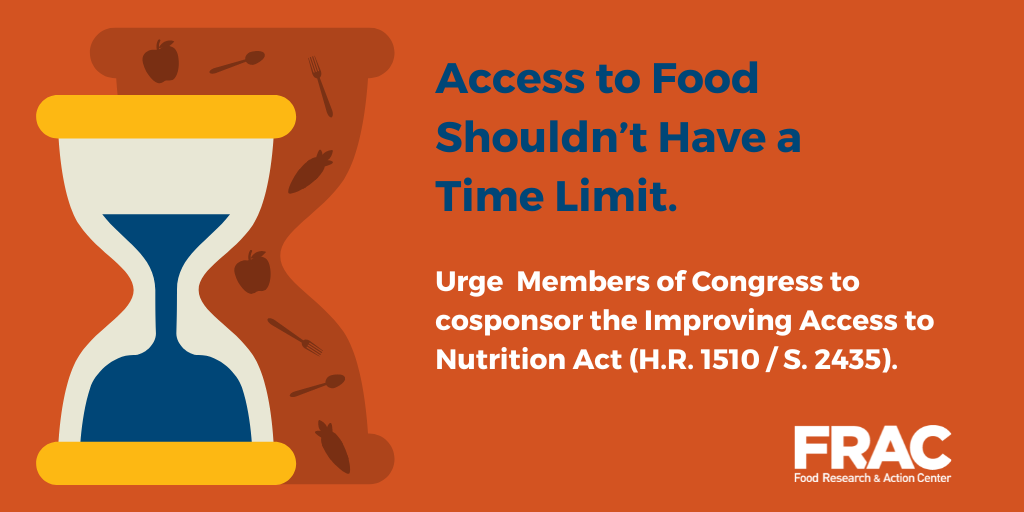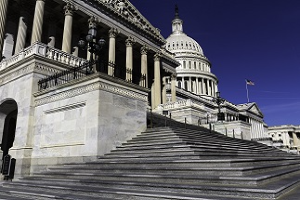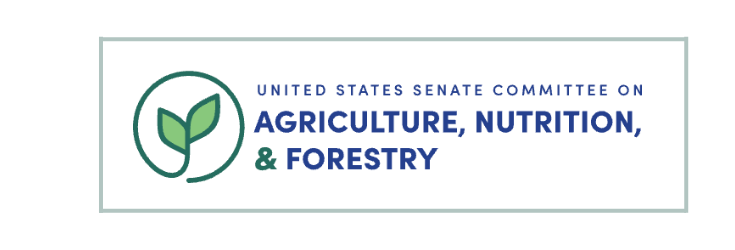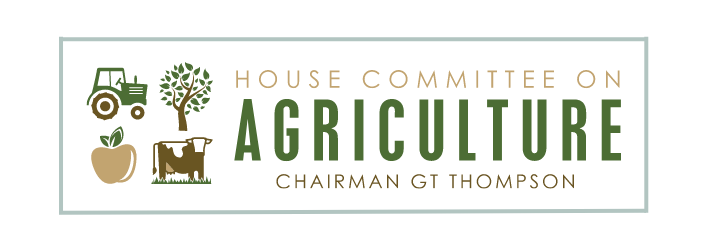What Is The Farm Bill?

The Farm Bill is a comprehensive package of legislation passed once every five years that has a direct impact on agriculture, food systems, and consumers. It covers programs ranging from crop insurance for farmers to healthy food access for low-income families.
The Farm Bill has different sections — known as titles — that can change over time. The 2018 Farm Bill had 12 titles. Out of those 12 titles, Title Four, is the most relevant for anti-hunger advocates. The Nutrition title covers the Supplemental Nutrition Assistance Program (SNAP), as well as a variety of smaller nutrition programs to help individuals and families with low-incomes afford food.
- Closing the Meal Gap Act (H.R. 3037/S.1336)The Closing the Meal Gap Act championed by Rep. Alma Adams (D-NC) and Sen. Kirsten Gillibrand (D-NY) will boost Supplemental Nutrition Assistance Program (SNAP) benefits for all participants and make further improvements.
SNAP benefit adequacy will be improved by:
- replacing the Thrifty Food Plan with the more appropriate Low-Cost Food Plan as the basis for SNAP allotments;
- eliminating the cap on the SNAP Excess Shelter Deduction; and
- streamlining SNAP Standard Excess Medical Deductions for persons who are older or have disabilities (with a minimum standard of $140).
These changes will ease choices too many people face between paying for food and rent or between paying for food and medicine.
- Improving Access to Nutrition Act (H.R. 1510/S. 2435)
 The Improving Access to Nutrition Act championed by Rep. Barbara Lee (D-CA) and Sen. Peter Welch (D-VT) would eliminate three-month time limits on SNAP eligibility for certain working-age adults who cannot document sufficient hours of work. The current law provision takes food off the table of unemployed and underemployed people. The proposal is a long overdue and permanent law change that will promote food security and equity for Americans with low incomes.
The Improving Access to Nutrition Act championed by Rep. Barbara Lee (D-CA) and Sen. Peter Welch (D-VT) would eliminate three-month time limits on SNAP eligibility for certain working-age adults who cannot document sufficient hours of work. The current law provision takes food off the table of unemployed and underemployed people. The proposal is a long overdue and permanent law change that will promote food security and equity for Americans with low incomes.
Read FRAC’s Don’t Time Limit Food for People in Need: SNAP Talking Points, and use these talking points in your own advocacy. Read FRAC’s new research brief, Maintaining SNAP Benefits for Unemployed and Underemployed People Struggling in the Labor Market.
Use FRAC’s customizable email template (.docx) to urge your Members of Congress to support this vital legislation.
Use the FRAC Action Network to urge your Members to support this critical legislation. View Senate and House cosponsors.
- Enhance Access to SNAP Act (EATS Act) (H.R. 3183/S.1488)The Enhance Access to SNAP Act (EATS Act) championed by Rep. Jimmy Gomez (D-CA) and Sen. Kirsten Gillibrand (D-NY) would put college students with lower incomes on an equal footing with other people in qualifying for SNAP. SNAP would no longer condition eligibility for most people attending college at least half time on performing work study, or 20 hours or more per week of outside employment.
Use the FRAC Action Network to urge your Members to support this critical legislation. View Senate and House cosponsors.
Read this sign-on letter to House and Senate Agriculture Committee leadership urging them to support the EATS Act.
- Hot Foods Act (H.R. 3519/S. 2258)The Hot Foods Act championed by Rep. Grace Meng (D-NY) would permanently end the prohibition on use of SNAP benefits to purchase hot prepared foods from food retailers. The proposed change would afford SNAP customers broader choices available to other food shoppers. View Senate and House cosponsors.
- Lift the Bar Act (H.R. 4170/S.2038)The Lift the Bar Act championed by Rep. Pramila Jayapal (D-WA) seeks to restore access to public programs for lawfully present immigrants by removing the five-year waiting period and other restrictions to SNAP eligibility. The proposal also would remove that waiting period in Medicaid, the Children’s Health Insurance Program, and the Temporary Assistance for Needy Families Program. Bill highlights. View Senate and House cosponsors.
- Restore Act (H.R. 3479/S. 1753)The Restore Act championed by Reps. Steve Cohen (D-TN), John Rutherford (R-FL), and Sens. Cory Booker (D-NJ), and Raphael Warnock (D-GA) would repeal the lifetime federal ban on individuals with felony drug convictions from receiving SNAP. Bill highlights. View Senate and House cosponsors.
- Enhanced Cybersecurity for SNAP Act (H.R. 7585/S. 3893)Introduced by Reps. Andy Kim (D-NJ) and Mike Lawler (R-NY), and Sens. Ron Wyden (D-OR), John Fetterman (D-PA), and Bill Cassidy (R-LA), the Enhanced Cybersecurity for SNAP Act would improve EBT security by providing a timeline for states to transition to chip cards and reimbursing states for some of the transition costs. Read an overview from Sen. Ron Wyden.
- Fairness for Victims of Skimming Act (H.R. 6005/S. 3089)Introduced by Reps. Dutch Ruppersberger (D-MD) and Mike Lawler (R-NY), and Sens. John Fetterman (D-PA) and Kirsten Gillibrand (D-NY), the Fairness for Victims of Skimming Act would permanently extend replacement benefits and full replacement of stolen benefits for SNAP participants. Read an overview from Sen. Fetterman. Read FRAC’s fact sheet, Skimming: Tackling SNAP Benefit Theft.
- Additional Supporting PrioritiesAdditional proposals would provide more equitable access to SNAP, including for residents of Puerto Rico, American Samoa, and the U.S. Virgin Islands, as well as for formerly incarcerated individuals.
Here’s How You Can Take Action
1. Advocacy
-
-
Use the FRAC Action Network to quickly and easily contact your Member of Congress and urge them to oppose efforts to weaken or cut SNAP to finance other provisions in the Farm Bill.
-
-
-
Visit House and Senate for instructions on how to contact your Member. Use FRAC’s customizable email template to send your Members a message.
-
2. Community Engagement
-
-
Collect stories to document the harm and negative impacts that the hunger cliff and other efforts to weaken SNAP have done in your community.
-
3. Media
-
-
Engage media – print and social – to alert Members of Congress to anti-hunger priorities.
-
-
-
FRAC and more than 1,400 national, state, and community-based organizations signed onto a letter urging Congress to protect and strengthen SNAP. Use FRAC’s communications toolkit to spread the word.
-
SNAP Resources & Talking Points

SNAP State-by-State Fact Sheets
Discover the state-level impacts of SNAP and find the many reasons why Congress should reject proposals that cut SNAP benefits or access to SNAP in FRAC’s Protect SNAP to Reduce Hunger and Strengthen Local Economies fact sheets.

Continuing the Thrifty Food Plan Adjustment Is Good for Everyone
Learn why the Thrifty Food Plan adjustment should be protected in the Farm Bill and in other legislation in FRAC’s Continuing the Thrifty Food Plan Adjustment Is Good for Everyone.

Fact Sheet – FRAC Facts: SNAP Strengths
Did you know that SNAP stimulates the economy and supports working families? Find more talking points on the importance of SNAP in FRAC’s new FRAC Facts: SNAP Strengths fact sheet, updated for 2025.

Protect and Strengthen SNAP by Preserving Consumer Choice
Congress must adhere to bipartisan and public support to preserve consumer choice for the Supplemental Nutrition Assistance Program (SNAP) in the FY 2024 Agriculture Appropriations Bill, the upcoming Farm Bill, and any other legislative vehicles. Also see FRAC’s latest research brief to learn why protecting SNAP choice is so urgent.

SNAP Merit Staff Preserve Program Integrity
Under the Intergovernmental Personnel Act of 1970, roles involving eligibility determination and certification must be performed by merit-based employees – nonpartisan public service employees who receive extensive training. Attempts to waive or skirt the merit-staffing requirement have failed SNAP participants and taxpayers.
Learn why Congress should continue to uphold the merit system in FRAC’s fact sheet, SNAP Merit Staff Preserve Program Integrity.

Joint Letter: Over 1,800 National, State, and Community-based Organizations Sign a Letter Urging Congress to Protect and Strengthen SNAP
The Food Research & Action Center (FRAC) and more than 1,800 national, state, and local organizations from every state in the country signed on to a letter urging Congress to reject any proposals that would cut or weaken the Supplemental Nutrition Assistance Program (SNAP) and the child nutrition programs.

Leave Behind: Congress Must Protect and Strengthen SNAP and Other Federal Nutrition Programs
The Supplemental Nutrition Assistance Program (SNAP) is the cornerstone of the nation’s nutrition and food security safety net, helping to put food on the table for over 41 million participants each month. Congress must protect the Thrifty Food Plan and other SNAP provisions from any cuts. Use this 2024 Leave Behind in your advocacy.
Farm Bill Leave Behind: Congress Must Protect and Strengthen SNAP, TEFAP, and Other Anti-Hunger Programs
SNAP is the cornerstone of the nation’s nutrition and food security safety net, helping to put food on the table for 42 million participants with low incomes each month. When the number of families struggling to make ends meet increases, SNAP responds quickly and effectively to meet that need. Learn more about SNAP priority legislation, along with Farm Bill priorities for TEFAP and other anti-hunger programs.
The Farm Bill Process
Every five years, the Farm Bill expires and is updated: it goes through an extensive process where it is proposed, debated, and passed by Congress and then signed into law by the President. Each Farm Bill has a unique name, and the current Farm Bill is called the Agriculture Improvement Act of 2018.
Farm Bill 101 Webinar
The Key Players
Members of Congress who sit on the Senate and House Committees on Agriculture, Nutrition, and Forestry hold the primary responsibility of drafting Farm Bills.


